How Luis Alberto Urrea found his family’s hidden history
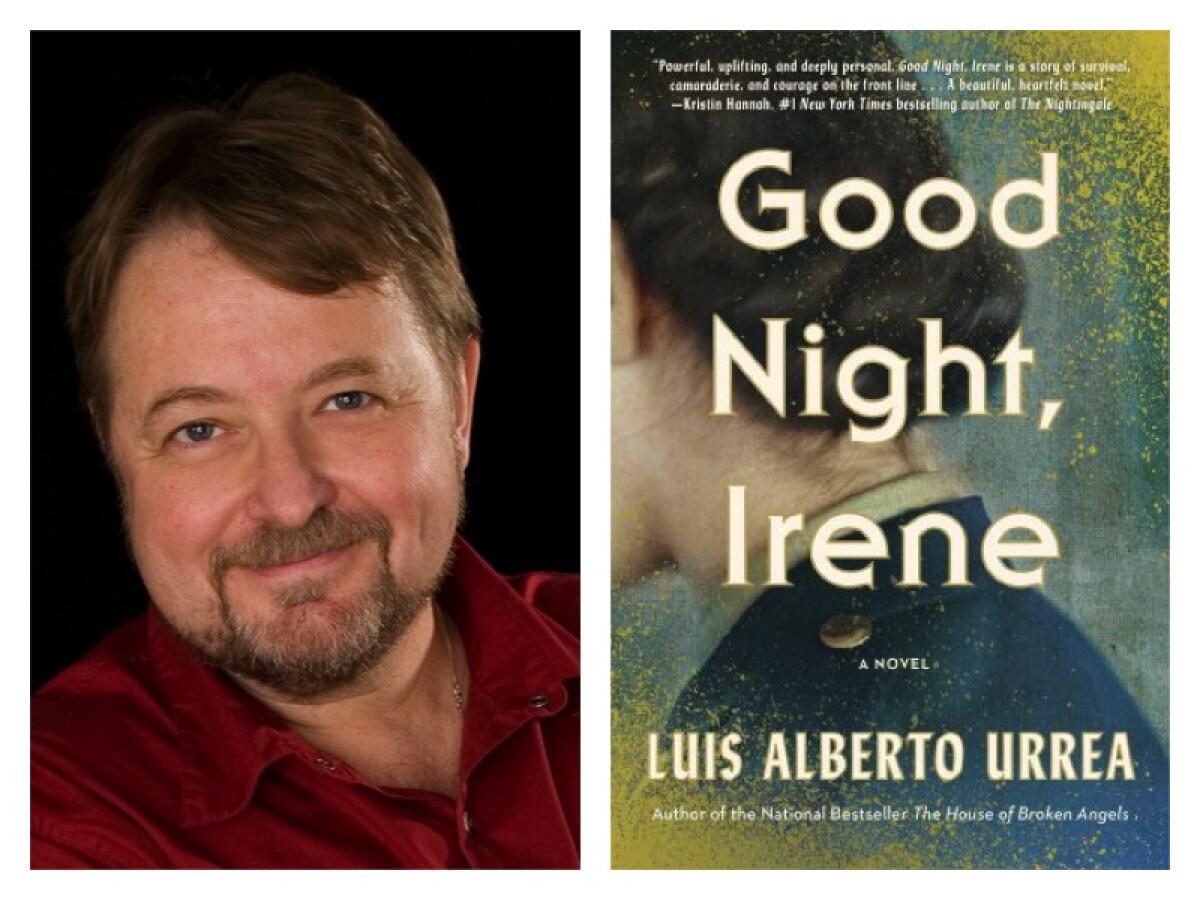
Good morning, and welcome to the L.A. Times Book Club newsletter.
More than 16 million Americans served during World War II, an era memorialized in books, film, monuments and our collective imagination.
Yet some chapters remain overlooked, never shared, not even at home. After his mother’s death, author Luis Alberto Urrea discovered such a hidden history buried in his own family.
On July 19 Urrea joins book club readers to discuss “Good Night, Irene,” a bestselling novel inspired by his mother’s wartime secrets.
Phyliss Irene McLaughlin de Urrea left her family to serve with the Red Cross Clubmobile corps. Known as the Donut Dollies, the volunteers rumbled across Europe in 2.5-ton trucks fitted with coffee machines and doughnut makers. They brought GIs mail, chewing gum and even a record player for some cheer on the front lines.
Urrea’s mother never returned home to New York after the war; instead she started a new life in California. And she never talked about her past. She kept an old Army footlocker at home but told her young son never to open it.
“I knew from the deep scars on her legs, that she came back from the war horribly wounded,” Urrea writes in an essay for Time magazine.
Urrea decided to research his mother’s WWII experiences after her death and was surprised at the scarce information available about the Donut Dollies and their service.
So the writer and his family retraced Phyllis’ steps across London and drove the back roads of Germany and Austria. “We followed her shadow to Buchenwald, where [General George S.] Patton asked the Clubmobile crews to help support the liberation of the camp,” Urrea writes. “And then, I saw from a distance the Bavarian hills from which she plummeted one night in a jeep accident that nearly severed her legs.”
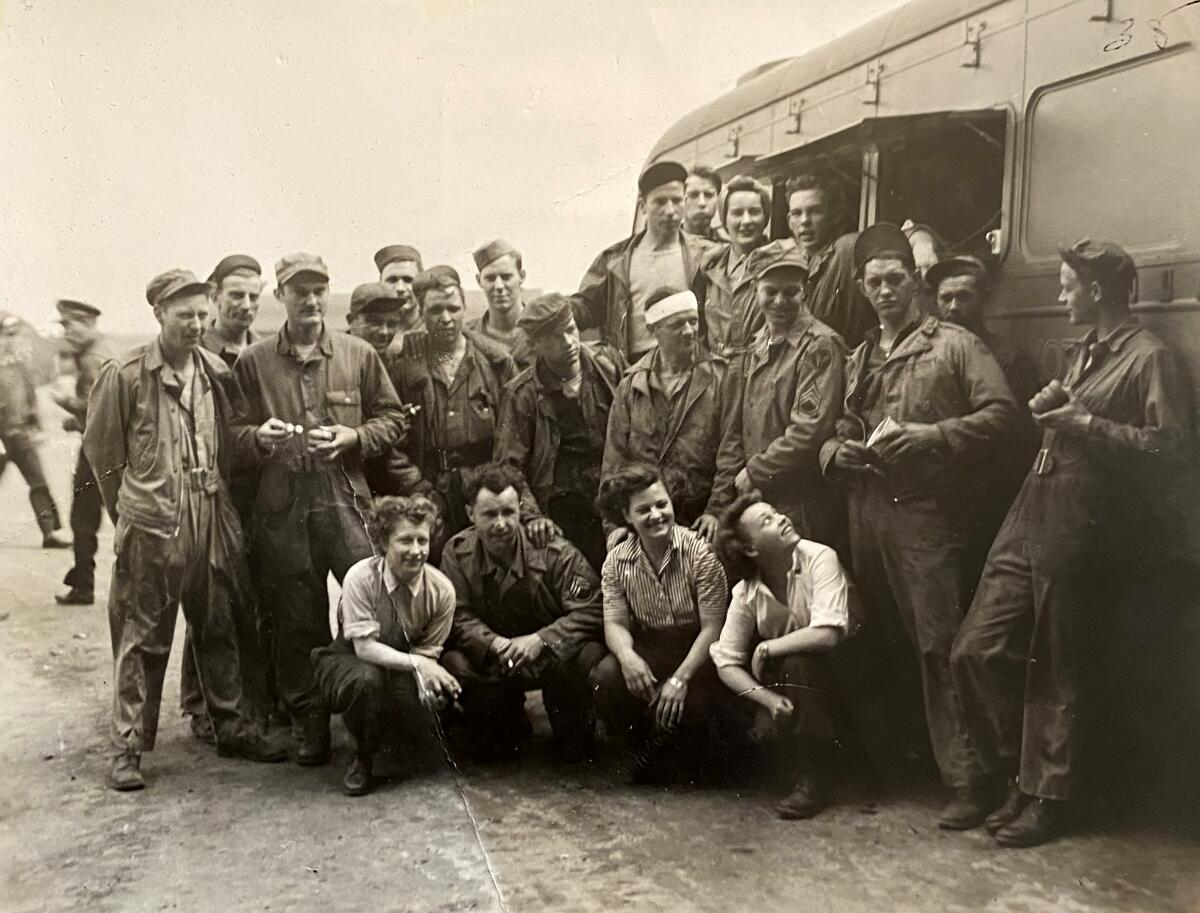
The author of 17 novels and nonfiction books, Urrea spent the past decade working on his historical novel, a departure from his works set on the U.S.-Mexico border. The book’s heroine, Irene Woodward, a blue-blooded New Yorker fleeing a soured engagement, stands in for Urrea’s mom, who came from a similar background.
“I think you have to get to a certain place in life to trust that a dear boy’s story about his mama is as important as a daring, hard-boiled investigation into the Border Patrol and a hideous death in the desert,” Urrea told The Times.
Urrea will discuss “Good Night, Irene” with Times editor Iliana Limon Romero at 6 p.m. PT July 19. Sign up on Eventbrite for this live streaming book club night.
Q&A: What would you like to ask Luis Alberto Urrea? As you read the book, share your questions and comments in an email to bookclub@latimes.com.
Book club turns 4
In a time of division, the L.A. Times Book Club brings Los Angeles together every month. We celebrate the world of ideas and getting lost in a great story. That’s been our mission, and our joy, for four years and counting.
Along the way, we’ve welcomed a U.S. president and the priest who founded Homeboy Industries. We’ve read works by activists and actors, National Book Award honorees, poets laureate and Pulitzer Prize winners, acclaimed filmmakers, world-class chefs and bestselling novelists, the world’s most renowned naturalist and a tennis legend who learned to play on the public courts of Long Beach.
It all began on June 25, 2019, when the L.A. Times Book Club debuted with Susan Orlean, author of “The Library Book,” set in Los Angeles’ Central Library.
As the L.A. Times Book Club turns 4, here’s a look at where we’ve been.
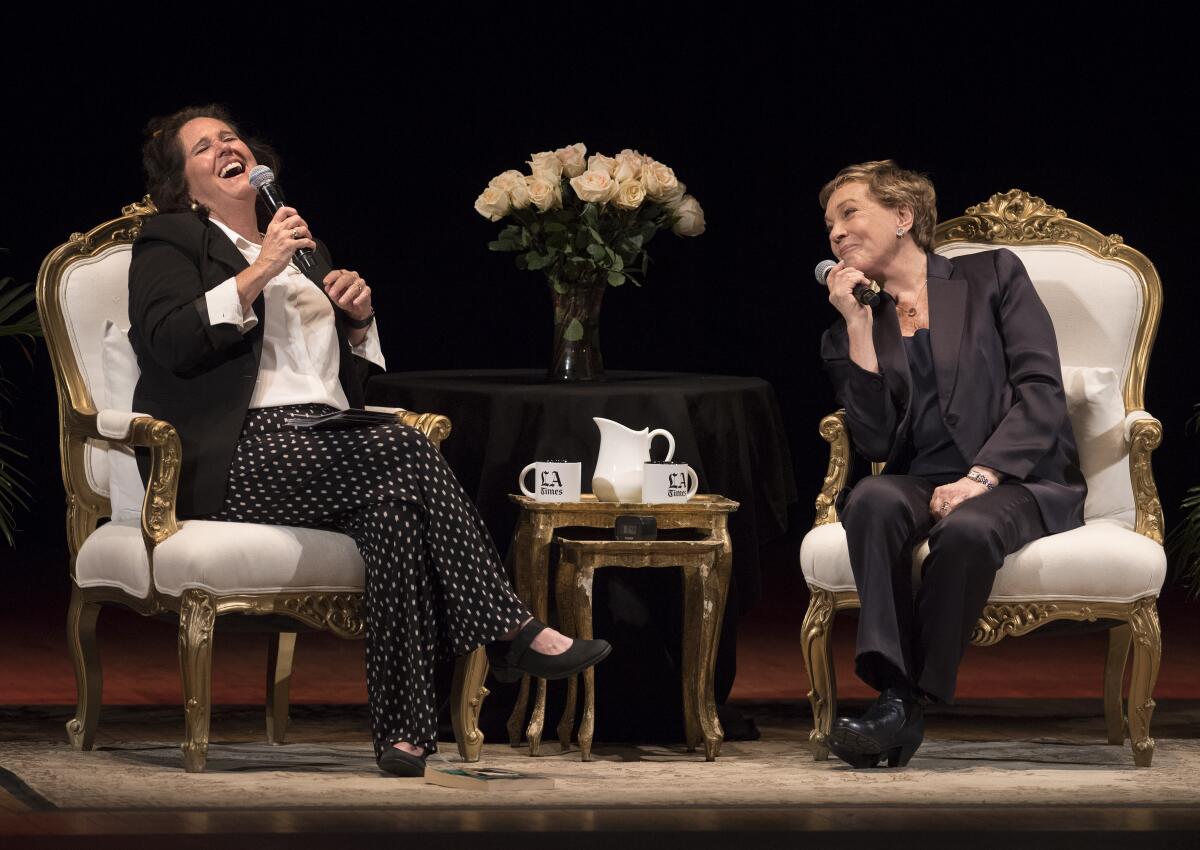
Thank you to all readers who join us every month, who show up at in-person and virtual events, and take the time to send so many comments, questions and suggestions. Two longtime Times readers separately told me at May’s banned book night how much comfort our meet-ups brought during the pandemic and how much they enjoy the books we read together.
Join us: If you value our community book club, please sign on as a supporter of the Los Angeles Times Community Fund. You’ll help us produce more in-person and virtual book club conversations throughout the year. We’ll also feature your name at the next book club night. Here’s how.
Book club goes to the birds
Christian Cooper, the avid birdwatcher whose story went viral after he was falsely accused of threatening a woman in Central Park, joins book club readers Aug. 16 to discuss “Better Living Through Birding: Notes From a Black Man in the Natural World.”
A science and comics writer and editor, Cooper will be in conversation with Times writer Carla Hall about his memoir and his new National Geographic series, “Extraordinary Birder,” which follows Cooper’s avian adventures around the world.
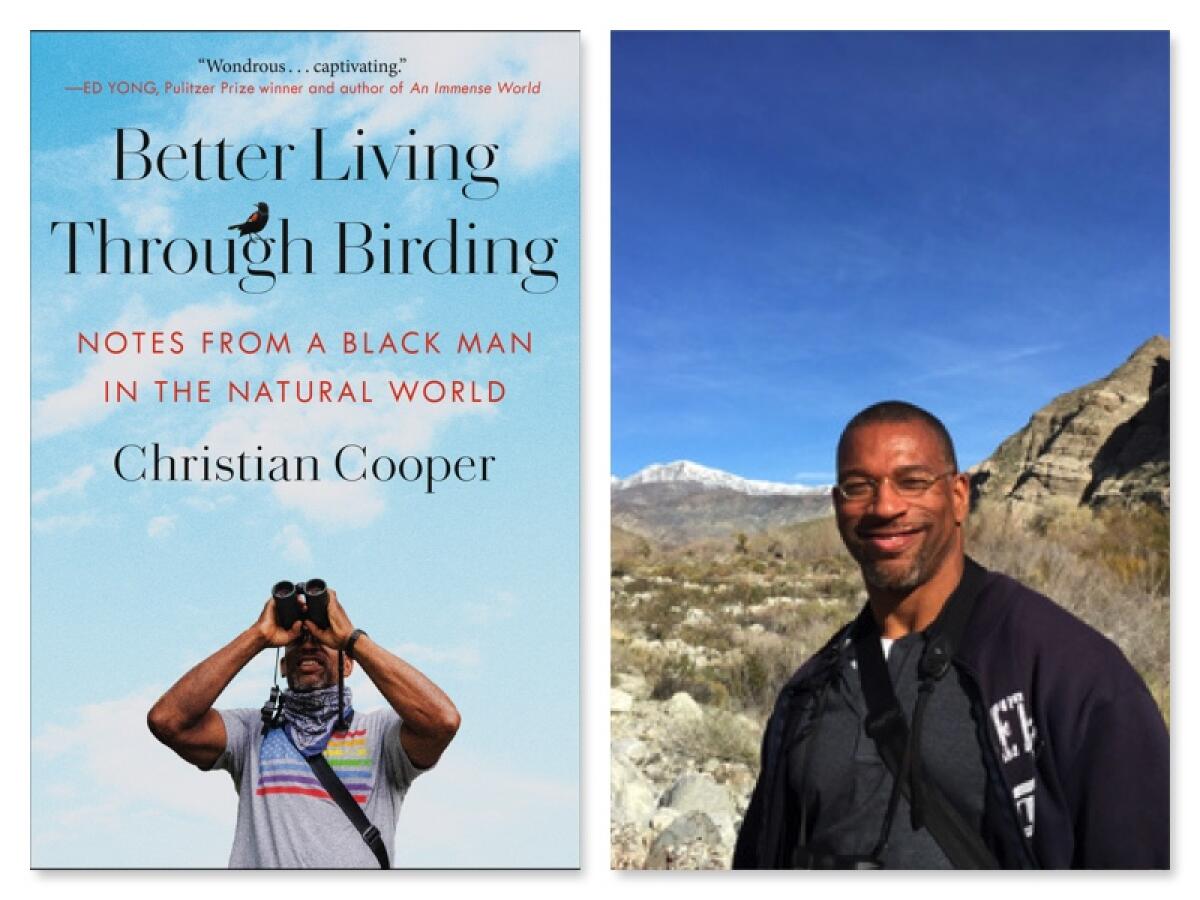
Cooper made headlines in May 2020 after a white woman called police saying he threatened her and her dog in New York’s Central Park. Cooper had asked the woman to leash her dog and recorded the encounter.
“Better Living Through Birding” delves into the Central Park incident and also is a travelogue, birding primer and memoir about Cooper’s life as an activist, nature lover and comic book creator.
Get tickets: This virtual event will be live streaming at 6 p.m. PT on Aug. 16. Sign up on Eventbrite.
Keep reading
Family saga: How COVID and an antique marriage bed inspired Lisa See’s new historical novel, “Lady Tan’s Circle of Women.”
Imagination Library: Singer and author Dolly Parton is expanding her free books program to children across all 58 counties of California. Parton’s Imagination Library will provide California children younger than 5 with a free book — available in English or Spanish — every month.
Father’s Day browsing: Are these “The 21 Best Books About Fatherhood”? From Esquire.
What happens when we die? “Jeopardy!” host Ken Jennings searches for answers in “100 Places to See After You Die.” Jennings tells the Washington Post: “When you think about what you can take with you, it’s clearly not material things. But it might be the relationships you have. I would like to think that that continues.”
Page to screen: Jennifer Garner talks about adapting Laura Dave’s bestseller, “The Last Thing He Told Me,” and how she persuaded Hollywood she was right for the role.
Memoirist’s mission: Times reporter Keri Blakinger chronicles her experiences as a star athlete, addict, inmate and journalist in “Corrections in Ink,” now in paperback. “All the futility, the small cruelties, the refusal to see us as fully human — it was not a flaw in the system,” she says. “It was the system.”
Culture awards: The Los Angeles County Library will receive a 2023 National Medal for Museum and Library Service, one of two Southern California institutions that will be honored this summer. The library joins the Riverside Art Museum amongeight winners, via CBS News.
Your daily reads: U.S. news organizations are reeling from a record 17,436 job cuts so far in 2023. That includes deep layoffs at the L.A. Times and Southern California Public Radio’s LAist. Increasing the number of digital subscribers is critical to the survival of local news. If you don’t already, please subscribe here for just $1.

Elliot Page in Hollywood
Actor Elliot Page joined the L.A. Times Book Club June 8 to discuss “Pageboy” and his journey to become the world’s most famous transgender man.
“The Umbrella Academy” star talked about growing up in Halifax, Canada, feeling uncomfortable in his own skin even as a child of 6 and the unrelenting pressure of trying to conform to others’ expectations.
Watch here.
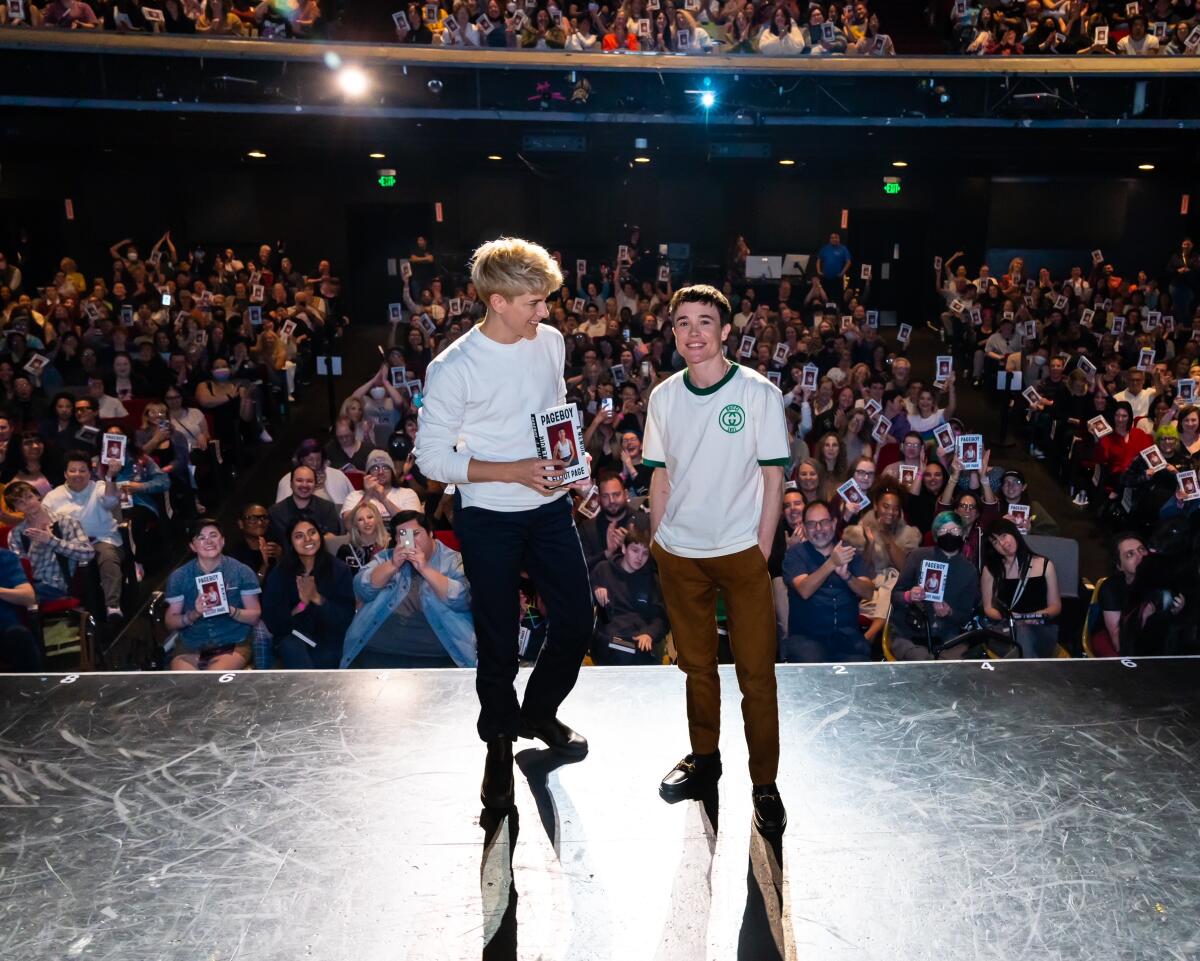
Page was in conversation with Mae Martin, whose new stand-up special, “SAP,” is on Netflix.
My apologies to Martin, who uses the pronouns they/them; I misspoke during their introduction. Also my gratitude to Martin, who joined book club night when actor Kate Mara had to cancel due to illness.
In May, Page completed filming the final season of “The Umbrella Academy,” a Netflix series.
“I just feel so much better on set,” Page said during an interview with Times columnist Amy Kaufman. “More centered. More patient. There’s an ability to enjoy the work that I haven’t felt for a very, very long time.”
Last word
“His incantatory prose can transport the reader across time and space into a universe every bit as morally complex as our own,” writes Jim Ruland about novelist Cormac McCarthy, who died this week in Santa Fe.
“For better or worse, one emerges from a McCarthy novel with new knowledge about the way the world works; it’s up to the reader to decide what to do with that information.”
Sign up for our Book Club newsletter
Get the latest news, events and more from the Los Angeles Times Book Club, and help us get L.A. reading and talking.
You may occasionally receive promotional content from the Los Angeles Times.




